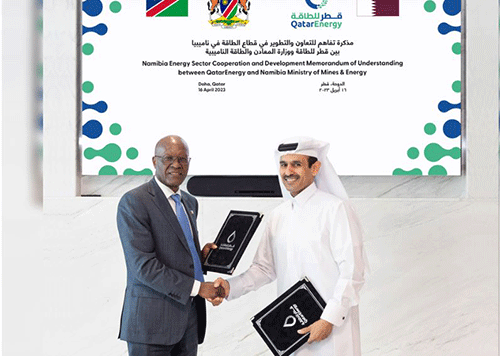Attracting investments remains at the top of Namibia’s economic agenda.
This is after the country recently gained popularity as a global investment hotspot and as one of the globes’ favourable oil and gas exploration destinations due to its world-class infrastructure, renewable resource potential and recent fossil fuel discoveries.
Deputy director of Compliance and Regulation in the mines and energy ministry Carlo McLeod stated that Namibia, via the ministry, entered into an agreement with QatarEnergy.
The objective of the agreement, he said, is based on three areas, including the enhancement of strategic planning on investment opportunities.
QatarEnergy is the state-owned petroleum company of Qatar.
The company operates oil and gas activities in Qatar, including exploration, production, refining, transport and storage.
“Namibia would want to benefit from workforce development in managerial and technical skills, and industry knowledge-sharing on which we want to exchange views on policies, large-scale projects and sustainable opportunities,” said McLeod in response to queries from New Era.
According to a daily newspaper in Doha, the agreement was signed by Saad Sherida Al-Kaabi, Qatar’s minister of State for Energy Affairs, the President and CEO of QatarEnergy, as well as Namibia’s mines and energy minister Tom Alweendo.
The special signing ceremony was held at QatarEnergy’s headquarters in Doha.
The daily newspaper reported that at the signing, Al-Kaabi said QatarEnergy was pleased to further increase its cooperation with Namibia and build on the company’s recent successes in Namibia.
“This agreement further strengthens our relationship as we work jointly towards a prosperous future,” he said.
At the beginning of last year, QatarEnergy announced a light oil discovery in the Jonker-1X well in the Orange Basin, offshore southern Namibia, adding to two previous oil and associated gas discoveries in the same basin.
“QatarEnergy holds interests in three Exploration Licenses offshore Namibia: PEL-39 (45%), PEL-56 (30%) and PEL-91 (28.33%), covering a total area of over 28 000 km²,” reads the report.
World-class renewable resources
Meanwhile, the Global Electricity Review 2023 stated the wind and solar energy generation reached record highs in 2022, and they are expected to drive falling emissions as soon as 2023.
The report analyses electricity data from 78 countries, representing 93% of global electricity demand and includes estimated changes in the remaining generation.
The report also dives deeper into the top ten carbon dioxide (CO2) emitting countries and regions, accounting for over 80% of global CO2 emissions.
In Africa, the report stated, Namibia was the first country to lead for wind and solar share in Africa with 25%.
Morocco followed Namibia with 17%, and then Kenya with 16%.
Elsewhere on the continent, reliance on solar and wind is mostly far below the global average of 12%.


